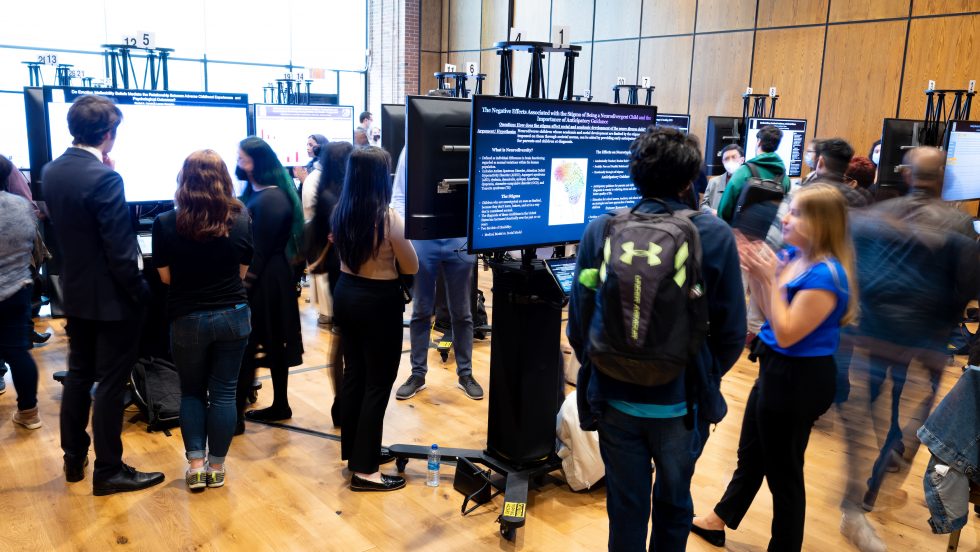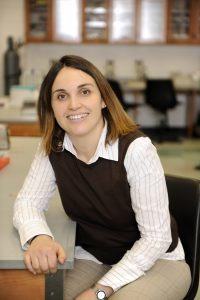
Adelphi is committed to transforming the lives of our students, and conducting research or working in depth on a creative project can be one of the most transformative experiences undergraduates can have at college.
Engaging in original work sharpens critical thinking skills and improves communication and expression. It is incredibly fulfilling, and it is a key driver of student success.

Eugenia Villa-Cuesta, PhD
This year, Adelphi increased its emphasis on research by launching an Office of Undergraduate Research and Creative Works designed to guide students to research opportunities and provide mentoring and support throughout the research process.
Adelphi already offers a range of research opportunities for students, including assistant lab positions, independent study projects, Honors College summer internships and an Emerging Scholars Program in psychology. The new office will build on this foundation to help more students access hands-on learning experiences at Adelphi.
We spoke with Eugenia Villa-Cuesta, PhD, director of the office and associate professor of biology, to learn more about this initiative.
How did the idea for the Office of Undergraduate Research and Creative Works come about?
This idea was originated by the University Libraries and the Office of the Provost. They wanted to promote more research collaborations among faculty and students and support undergraduate research and creative works. These things were already happening at Adelphi, but we wanted to bring them to the next level.
What do you hope to achieve with the office?
We hope that every undergraduate student who comes to Adelphi is able to get involved in research and creative endeavors as part of their education.
My personal hope is that everybody who graduates from Adelphi University has had a chance to be part of generating knowledge instead of being passive receivers of what other people have done. This research-based approach is more in line with how people learn. And I think it’s what differentiates a place of higher education. Every student can benefit from undergraduate research and mentorship. And every faculty member can benefit from having a diverse group of students doing research with them.
What kinds of resources will the office provide to support student and faculty research?
We’re working on promoting research and creative works in many different ways. First, we’re part of the Council on Undergraduate Research so that everybody at Adelphi—faculty, students and staff—can access resources and be part of our community.
We would also like to make students aware that research is being conducted across disciplines—from psychology to nursing to STEM. They might think research is only done with a lab coat and goggles, but that is not true. There are many kinds of research being done at Adelphi, so we’re helping to spread the word.
We’re using social media to highlight some of the wonderful work that our students are doing with their mentors. We have a web page for sharing information about how students can get involved in research, and we’d like to host an informal workshop. We get a lot of questions from students, such as: How do you start? How do you approach a mentor? How do you take research for credit? So we’re providing guidance.
We’re also working with many other offices at the University that are already established, as well as individual faculty members, to facilitate more collaborations with students. We want to help students more easily find mentors in their specialties and fields, and we want to help faculty find interested students.
Why are research experiences so important for students?
Research does more than just complement an education. It can be a transformative experience for many students. Hands-on learning and mentorship experiences can change the perceptions that students have about themselves. They become more confident in their ability to learn and to do well. They present material that is complex in a very articulate way. They’ve done that just by being part of doing the work instead of being talked at. And then they start seeing themselves as scholars and as smart, because they are. They just may not have had access to the resources they needed.
Faculty can also get to know their students a lot more by seeing how they troubleshoot or approach challenges. They get to understand them very well and therefore teach them more effectively.
What are your hopes for the future of the office and its impact at Adelphi?
I’m starting to plant the seeds, but we need to build support so that we can make undergraduate research and creative works part of the academic education for our students. Our faculty members are really motivated in what they do, and because of Adelphi’s size, we get to know our students well and provide personalized educational experiences. So, I hope that we take advantage of that and grow even further to make a greater impact.